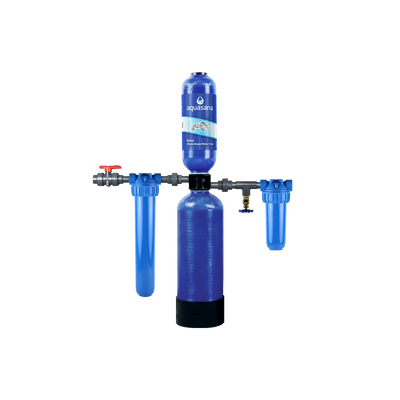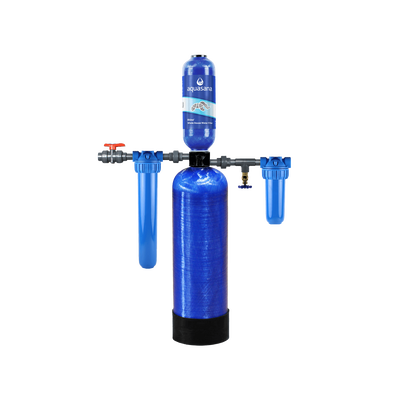What is hard water?
Hard water is characterized by high levels of dissolved minerals, typically calcium and magnesium. These minerals are undetectable to the naked eye, but give water a distinct taste and are associated with several issues like scale buildup that increases your home’s risk of pipe bursts, decreases the life of your appliances, and raises energy bills.
How to test for hard water
According to the U.S. Geological Survey (USGS), approximately 85% of homes have hard water — meaning the question isn’t so much “Do you have hard water?”, but rather “What is the hardness of your water?” To help you figure out if your home has hard water and its hardness level, here are a few tests you can do.
1. DIY soap and bottle test
For a fast and inexpensive option, try the soap and bottle test. For this test, you will need a clear bottle with a cap and liquid dishwashing soap. Start by filling a clean bottle with water from the faucet until it’s ⅓ full (at least 8-10 ounces). Then add 10 drops of dish soap. Put the cap on tightly, shake the bottle well for 10 seconds, then set the bottle down and look for foam. Water that is soft, or lacks hard minerals, will create a lot of suds. Below the suds, the water should look relatively clear. If you see this, it means your water is likely soft. If the solution does not foam up well, and the water below the suds is cloudy, then you likely have hard water.
Keep in mind that this test isn’t 100% accurate, and it also won’t indicate the hardness of your tap water. For more detailed and reliable insights, look to the other options below.
2. Your city’s water quality report
Rather than conducting your own DIY test, consider using a more in-depth testing report provided by the government for anyone who relies on public tap water. By law, every resident in the United States should have access to their local annual Water Quality Report. This report not only helps each citizen have a better understanding of what’s in their water, but is also designed to hold federal and state government agencies accountable. Your water quality report will indicate the hardness of your water by showing the level of minerals like calcium and magnesium. It will also show you other important information such as:
- Where your water is sourced: Is it from a lake, aquifer, or river?
- Health effects: How might using the water affect your health?
- Contaminants in your water, and at what levels: What contaminants are in your water, and what is their concentration? The report will also show if this is a violation of water quality standards.
Understanding a water quality report allows homeowners to see if they have hard water, and the severity of the issue in addition to details about other contaminants that are present. You can search online for your water quality report through your municipal city’s website or local water processing agency. However, this report is only available for public water supplies — meaning anyone who relies on well water will have to conduct their own test.

Additionally, while all city-treated water is held to safety standards by the EPA, the standards are meant to meet a “reasonable” level. This means your water may still contain traces of dangerous contaminants, as long as the contaminants are below the legally allowed levels. Remember this as you read your report and consider whether their standards meet yours.
3. Hard Water Testing Kit
A water testing kit is another tool for self-assessing your water quality. There are a variety of kits sold online or in home improvement and hardware stores. When choosing, be sure to select a kit designed by a reputable water-testing manufacturer to ensure you are getting the most accurate results. Also, make sure your kit tests for water hardness and avoid the ones that only test for specific contaminants.
Most water testing kits are designed to be performed at home and rely on using test strips or digital assessments. They can give you results in as little as five minutes. More advanced tests will ask you to take a water sample from your home and send it to an EPA-certified lab where experts will analyze your test results. This costs significantly more than a standard home test but will give you a precise and comprehensive analysis.
How to address hard water
Discovering you have hard water can be concerning, but fortunately, you have a few options to deal with it. There are easy changes you can make right away such as using distilled vinegar to clean calcium deposits, lowering your water temperature to prevent scaling, or finding products specifically designed to treat hard water stains. These options are great for short-term results, but don’t protect you against the more serious hard water issues like scale buildup in your pipes.
If you want comprehensive protection, consider investing in a water softener. Our SimplySoft® Water Softeners are installed at your home’s main water line to address the issue at its source and provide protection throughout your home. Our softeners are IAPMO certified to NSF/ANSI Standard 44 and CSA B483.1 for the reduction of water hardness, so you can trust in the system’s performance. Shop our water softeners to prevent hard water from being an issue in your home!
WHOLE HOUSE WATER SOFTENER
SimplySoft® 40,000 Grain Softener
Reduces minerals that cause hard water, providing softer, scale-free water from every tap in your home.
.png)


